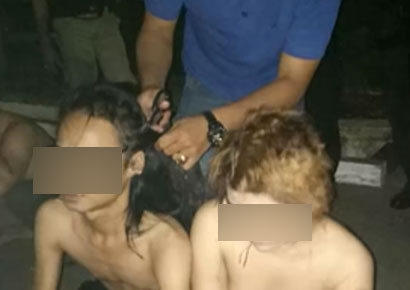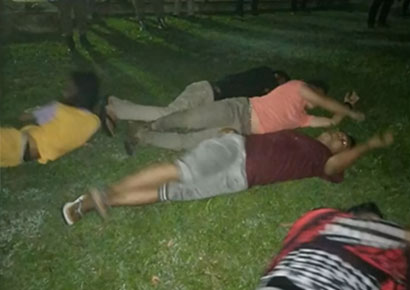Indonesia | Details of transgender women’s abuse by police emerge
 Some of the transgender women who were recently publicly victimised by police in Indonesia have detailed their harrowing abuse.
Some of the transgender women who were recently publicly victimised by police in Indonesia have detailed their harrowing abuse.
The women were brutally violated when police raided five beauty salons where they worked on 27 January in North Aceh. They were publicly humiliated, kicked and slapped, and had their hair cut in a bid to get “rid of all transgender people from Aceh”.
Amnesty International’s Indonesia office interviewed some of the victims in an undisclosed location, after they lost their jobs and suffered verbal and physical abuse from family members and the general public.
During the raids, the police chief delivered a speech condemning transgender women. Onlookers applauded his speech and shouted “oust them [from Aceh]. Just burn them. Just kill [them].”
“No right to dignity…”
After the raids, the police ordered the women to walk in a humiliating fashion to a nearby park, while shouting instructions at them and handcuffing one of the individuals.
In front of a gathering crowd, police forced the 12 people through a mock military training – apparently to make them “manlier” – by ordering them to roll on the ground in the park. When one of the transgender women refused to roll on the ground, the police chief fired a warning shot to scare her and others. A police officer later threw water on the face of one of the victims for protesting their inhumane treatment.
The police forced them to take off their clothes, leaving them only wearing trousers. One of them rejected the order and said: “Just shoot me. This is about dignity.” The police chief replied: “You as a transgender do not have the right to have dignity.”
A police officer later forcibly cut the hair of six of the victims to make them “look masculine”. The victims were later told to pee in a bottle for a urine drug test in front of many onlookers in the park, but they refused to do so.
The police instructed one of the victims to clean the bodies and hair of the others using a hose. The police chief later kicked her for what the police said was a failure to properly wash the others. Later, the police chief ordered the women to shout “like a man”. He slapped one of the victims on the face with a sandal because the victim could not shout “like men”. Another police officer later slapped the same victim with a sandal on her ears and mouth, cracking her lips.
After humiliating them for two hours, the police told them to walk to police cells at 1am. They were forced to sleep on the cold floor in their wet trousers without mattresses.
The police released 11 of the women the following afternoon, but only after they were forced to attend a religious sermon by a Muslim cleric who told them to return to “your nature” and that “it is OK to kill transgender or other LGBTI people because they are more evil than kafir [infidel]”.
The cleric also said that “the Tsunami hit Aceh [in 2004] because [of the sins] of transgender people” and if they did not change, nobody would take care and pray for them when they died.
One of the transgender women remained in police custody until January 29 after the police found a sexually explicit video on her mobile phone. Before the releases, the police instructed all 12 to sign a document – but did not allow them to read what was written on the paper. It was an agreement to not act “like women” in the future and not to complain about any police misconduct.
Some of the women have been intimidated by neighbours or even family members since the raid, and one victim was kicked and had a stone thrown at her several days after the raids. In addition, they are also unable to support their dependents since they have lost their jobs as a result of the raid.
Some of those who remain in Aceh have had no choice but to agree to “act like men” as demanded by the police, but they have had difficulties finding a job because people are afraid to hire them after the raid.
A ‘war against transgenders’
Usman Hamid, Amnesty Indonesia Executive Director, said there had been “a complete failure by the Indonesian authorities” to protect the women’s human rights.
“This horrific treatment and humiliation is in clear violation of the absolute prohibition of torture and ill-treatment, made even worse by the fact that it was carried out by local police and backed by clerics. It is appalling that a group of heavily armed police officers raided and arrested transgender women on the basis of nothing but hatred,” he continued.
“Local authorities and ordinary people, in the name of Shari’a law, have colluded to attack and humiliate these transgender women. We believe the actions of the police amount to torture under international law. Those responsible must be investigated and held to account, including those in the North Aceh police who carried out the raids in the name of a ‘war against transgenders’.”
The victims have been left deeply traumatised by the raid. Some of them are now on the run, seeking a safer place elsewhere to live in Indonesia.
 The raid took place against a backdrop of growing anti-LGBTI sentiments in Aceh. Instead of offering support to the victims, Aceh Governor Irwandi Yusuf has publicly stated that he supported the police raid on transgender women. At an anti-LGBTI rally on February 2, the governor also said: “We don’t hate lesbian, gay, bisexual people [personally], but we hate their behaviour.”
The raid took place against a backdrop of growing anti-LGBTI sentiments in Aceh. Instead of offering support to the victims, Aceh Governor Irwandi Yusuf has publicly stated that he supported the police raid on transgender women. At an anti-LGBTI rally on February 2, the governor also said: “We don’t hate lesbian, gay, bisexual people [personally], but we hate their behaviour.”
Despite the fact that the police chief is currently under internal investigation by the Aceh provincial police over the alleged ill-treatment of the transgender women, the spokesman from the same provincial police expressed support for the raid as he joined the anti-LGBTI rally.
“The harrowing tales of these women must be a wake-up call to the Indonesian authorities and people everywhere. The human rights of all Indonesians – whatever their sexual orientation, gender identity and experience – must be upheld and protected equally,” said Hamid.
“President Joko Widodo must instruct the National Police to order North Aceh police to stop attacking and start protecting transgender people, should they receive threats and intimidations from local people.
“They must also act urgently, together with other authorities, to ensure that the 12 victims are immediately given the protection they need and can return safely to their homes and work,” insisted Hamid.
Leave a Reply